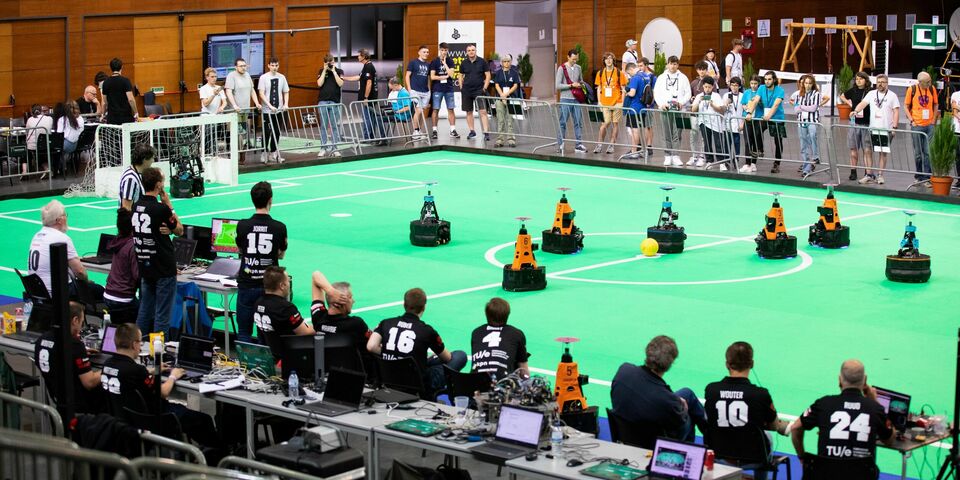Tech United prepares for World Cup in Bangkok
Checking the wheels, dusting the cameras and lubricating the hinges. Finally, the soccer and service robots created by TU/e team Tech United get to measure themselves against international competitors again. Due to the Covid-19 pandemic, RoboCup 2022, which takes place in Bangkok from July 10 to 17, will be the first robot World Cup in three years. Earlier this month, the soccer robots were given a chance to warm up during the European Championships in Portugal, where they pulled off a glorious victory against their fellow countrymen from company team VDL.
The fact that the tournament in Portugal was able to take place was a great relief for the soccer robots and their human supervisors, says team member Ruben Beumer. “Especially because we were finally able to practice against a real opponent again.” The title itself carried less weight; especially considering VDL was the only opponent. “Many teams halted all their activities during the pandemic, particularly in the Middle Size League, where our Turtles compete. That said, there were actually more teams competing in the league for smaller robots.” He expects that some six or seven teams will take on the Eindhoven soccer robots in Bangkok. “It’s quite exciting, because we have no idea how the opponents have developed these last few years.”
One thing is certain, Peter van Dooren adds: “A robot that has been non-operational for a few years will almost certainly no longer work. That means you’ll have to start testing again.” Mechanical engineer Van Dooren, who, like Beumer, is a PhD student working in the robotics group of Tech United founder René van de Molengraft, is in charge of Tech United’s ‘service branch’. Service robot HERO will be dispatched to Bangkok to participate in the @Home competition. “Nothing had been arranged for us in Portugal, so we practiced as best we could in our new home, the Impuls building.”
During the Covid-19 era, HERO practiced so-called “grasp detection”, Van Dooren says. For example, one of the assignments for the service robots was to bring a glass of water to a patient. “If they drop it, or fail to grasp it, most robots still don’t notice it. Our goal is for our robots to respond more to what is actually happening, and less to what has been programmed.”
The soccer robots have also been given an upgrade in recent years, Beumer says. “We’re currently trying to make the robots switch strategies during the match. We’re also teaching them to dribble better. They can only take the ball with them for a maximum of three meters, after which they have to release it before they are allowed to dribble again.” In addition, a lot of work has gone into integrating the information that the robots take in with various cameras into a so-called “world model”. “The robots can also share these world models with each other via their own WiFi network. That way, they gain a better overview.”
The most spectacular development in Bangkok is the new rule that the teams are also allowed to have a human player on the field. However, the human player can’t run with the ball, shoot at the goal or stand in the goal. “We will organize a selection contest to determine who can join the team”, jokes Beumer. He stresses that it is not yet a certainty that such a hybrid team will actually become a reality. “After all, the opponent has to be able to demonstrate that it’s safe.”
The fans at home can follow Tech United’s matches live or watch the summaries. For more information, stay tuned to the team’s website.




Discussion